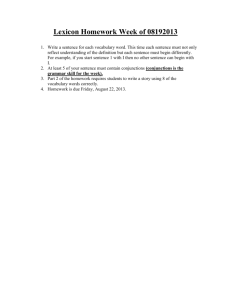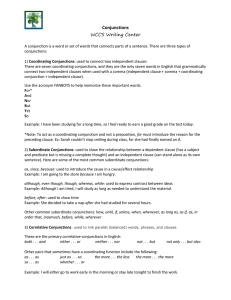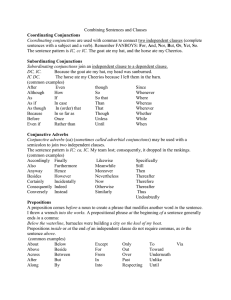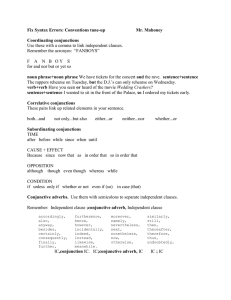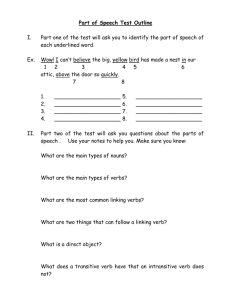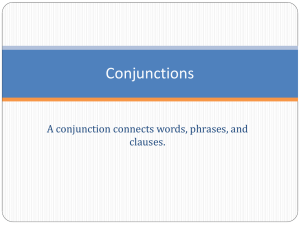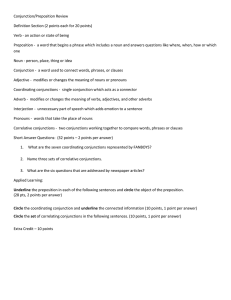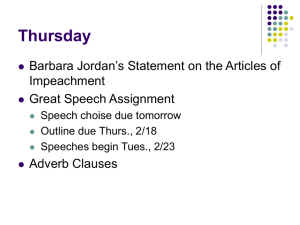Subordinate conjunctions
advertisement
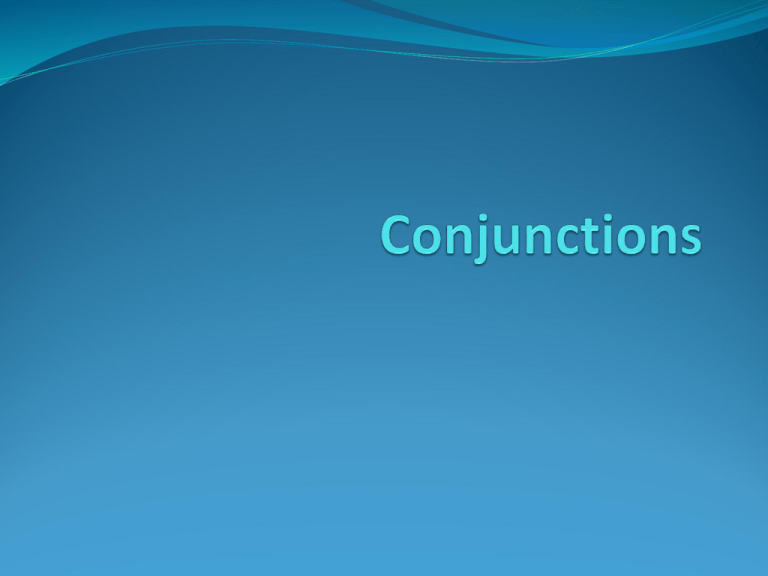
Independent Clauses Independent clauses consist of both a subject and a verb. An independent clause will always express a complete thought. SUBJECT + VERB = complete thought. My dog loves pizza crusts. The subject is __________________. The verb is ___________________. Dependent Clauses A dependent clause also has a subject and a verb. However, a dependent clause does not express a complete thought. A dependent clause by itself is called a fragment. SUBJECT + VERB = incomplete thought. As cola splashed onto the counter Because my dog loves pizza crusts Will not pass the “Guess what?!” test Independent or Dependent? A. Marcus has no consideration for the ecosystem rich with life in his backyard. B. When he cuts the lawn, he slows for nothing. C. As toads, lizards, and insects jump to the sanctuary of bushes to avoid the deadly mower blades. Conjunctions A conjunction connects together words or groups of words. They connect phrases, words, or clauses There are three types of conjunctions. Coordinating conjunctions connects things which are equally important in the sentence. Subordinating conjunctions connect a dependent clauses to independent clauses. Correlative conjunctions work in pairs to join two equally important parts of a sentence. Coordinating Conjunctions A coordinating conjunction is like a good matchmaker; it joins together two grammatical equals (word to word, phrase to phrase, and clause to clause). Unlike a good matchmaker, however, a coordinating conjunction always comes between what it is joining. FANBOYS The Seven Coordinating Conjunctions: FANBOYS F A N B O Y S For And Nor But Or Yet So Practice!! A. Rocky, my orange tomcat, loves having his head scratched, but hates getting his claws trimmed. B. Rocky terrorizes the oodles next door, yet adores the German shepherd across the street. C. Rocky refuses to eat dry cat food, nor will he touch a saucer of squid eyeball stew. Subordinate Conjunctions Subordinate conjunctions are used to introduce dependent (subordinate) clauses and connect them to independent clauses. A subordinate conjunction must be the first word of the dependent clause. Some Common Subordinate Conjunctions After Although As Because Before How If Once Since Than That Though Unless Even though Until Rather than When As long as In order that Provided that Why Where Whether While Whereve Whenever Even if r So that Than Though Practice!! A. Even though the broccoli was covered in cheddar cheese, Emily refused to eat it. B. Tanya did poorly on her history exam because her best friend Giselle insisted on gossiping during their study session the night before. C. Jonathon spent his class time reading comic books since his average was a 45 one week before final exams. Correlative Conjunctions Correlative conjunctions are word pairs that serve to join words or groups or words. Neither Claudia nor Peter had been to Mexico before. They found it not only beautiful but also rich in history. Some Correlative Conjunctions both… and whether …or not only… but also neither… nor either… or Practice!! A. "Neither the life of an individual nor the history of a society can be understood without understanding both." (C. Wright Mills) B. “Either you decide to stay in the shallow end of the pool or you go out in the ocean." (Christopher Reeve) C. "I have neither been there nor done that." (Bart Simpson, The Simpsons, 1999)
